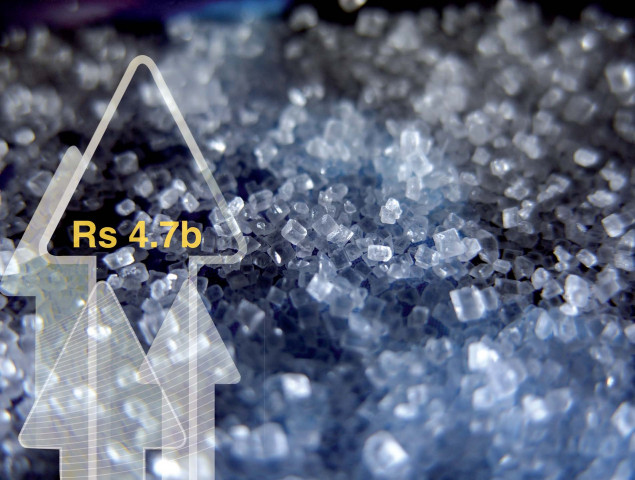Delay in sugar import causes Rs4.7b loss
The top auditor has found a nexus between a government agency and sugar barons.

Delay in sugar import causes Rs4.7b loss
The office of the Auditor General of Pakistan (AGP) has established that the Trading Corporation of Pakistan (TCP), tasked with ensuring the availability of sugar in the market, delayed a decision on the import of 200,000 tons of sugar before Ramazan in 2009.
“Non-compliance with (government) directives indicated that undue favour was extended to the sugar cartel, causing a crisis leading to a country-wide increase in prices and shortfall in supply,” the AGP concludes in the investigation.
The Economic Coordination Committee (ECC) of the cabinet had directed the TCP on February 3, 2009 to import 200,000 tons of refined sugar to cope with an anticipated shortfall following a decline in domestic production. The delay in import pushed sugar prices to Rs72 per kg from Rs36, a 100 per cent increase. Later, prices stabilised around Rs60 per kg.
The startling disclosure is contrary to the findings of the National Assembly standing committee on commerce which directly held the ministry of commerce and the ministry of industries responsible for the crisis.
“The TCP itself was not directly responsible, as both the commerce ministry and industries ministry wrote letters to the agency on May 29, 2009 asking it to immediately stop the import process,” said Engineer Khuram Dastagir Khan, chairman of the NA standing committee on commerce.
During an investigation by the committee, the TCP produced these letters in its defence, he said. “The delay in import created a crisis-like situation that forced the government to float a tender after three months at inflated international prices, which later became a benchmark for the domestic market and the sugar cartel made billions of rupees by fleecing the consumers,” he added.
At that time, the media aired footages of people making long queues and facing police ire in an attempt to buy just a 2kg bag of sugar at reduced price from utility stores.
Khuram said despite unanimous recommendations of the committee the government did not take any action, putting a question mark over the claim of Prime Minister Yousaf Raza Gilani that parliament has been strengthened through standing committees.
The AGP found that against the government’s decision to import 200,000 tons of sugar the TCP floated a tender for 50,000 tons on February 28, 2009 and that too was reduced later to 25,000 tons. On top of that, the TCP slowed down the process of sugar purchase for the balance quantity of 175,000 tons and subsequently suspended two tenders of 75,000 tons, opened on May 30 and June 6, 2009. Khuram said it was time when the two ministries colluded in favour of sugar barons but at the expense of consumers.
The TCP, the audit says, in violation of public procurement rules did not provide sufficient time to the bidders for participating in the tender for import of 75,000 tons. Against a specified time of 30 days, the agency provided 15 days to prequalified bidders and seven days to non-prequalified bidders.
“The insufficient period and discrimination against non-prequalified bidders deprived the government of the benefit of competitive rates, causing a loss of Rs3.8 billion in one case.”
The audit revealed that in another case the TCP rejected an offer of Al-Khaleej, Dubai for import of 100,000 tons of sugar at $451.5 per ton and instead gave the contract for 25,000 tons to Bung SA Geneva.
Later, the TCP management awarded two separate tenders for a total of 125,000 tons at $474 and $638 per ton to Al-Khaleej. This caused a loss of Rs840 million to the exchequer.
Owing to delay in taking action against those responsible, the same situation again arose in Ramazan this year when prices surged to new highs, said Khuram.
Published in The Express Tribune, October 13th, 2010.



















COMMENTS
Comments are moderated and generally will be posted if they are on-topic and not abusive.
For more information, please see our Comments FAQ